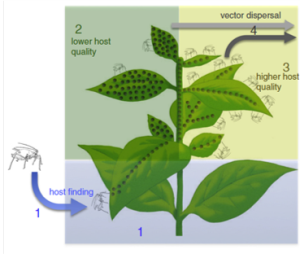Doutorando: Lucas A. Stempkowski. Data: 15/12/2020, às 16:00 horas pelo canal do YouTube (pos.fitopatologia UFV) Link: https://www.youtube.com/channel/UCCZZh5mUepI3YHAYxBuU7qw. Orientador: Francisco Murilo Zerbini
Insects play a key role in the infection cycle of many plant viruses serving as vectors of transmission between susceptible hosts. For a long time, transmission has been considered as an interaction between two partners, virus and vector. Recently, a third partner, the host, has been acknowledged to play a role in this interaction. Many studies have demonstrated that the tripartite virus-plant-vector interaction has important ecological and evolutionary implications. Vector-borne viruses often manipulate their hosts’ characteristics to influence the nature of the host-vector interaction and improve virus acquisition and/or spread. Such manipulative effects include changes in plant secondary metabolism or immune defense pathways to modify vector’s attraction, settling or feeding behavior in a way that can be more conducive for virus propagation. Overall, insect vectors tend to perform better on virus-infected plants, but the interaction between host and vector tends to be different depending on the type of virus-vector relationship (persistent or non-persistent). The objective of this seminar is to present the recent molecular data on the interplay between viral and plant factors that provide important clues to understand the different strategies that plant viruses use to manipulate plant host defenses pathways to improve vector fitness and transmission conditions, thus ensuring virus survival.

